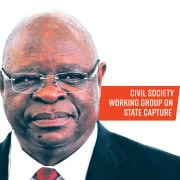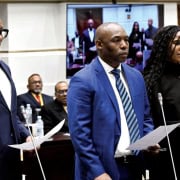|
Getting your Trinity Audio player ready...
|
Chief Justice Raymond Zondo overstepped his boundaries when he publicly made “inappropriate” remarks that undermined Parliament’s efforts in addressing state capture, says the institution’s spokesperson Moloto Mothapo.
Mothapo said this in a statement released last Thursday evening, 22 June 2023, in response to remarks made by Zondo earlier in the day at an event marking the occasion of the first anniversary of the release of the final state capture report in June 2022.
Zondo was speaking at a Human Sciences Research Council symposium that discussed the public impact of the state capture report and its implications. “The reason why it [Parliament] failed is well known. It is because the majority party refused to agree to the establishment of an inquiry to investigate the allegations,” Zondo said.
Had more been done at the time that the allegations first surfaced, he added, millions, if not billions could have spared in public funds.
“There were a number of instances where there was an opportunity for the majority party in Parliament to agree, but it did not and therefore the Guptas continued with their project and the transactions that happened afterwards happened because they were not stopped by Parliament when it could have stopped them.”
In the past, under the current system, it was the majority party in the National Assembly that deterred investigations until it was too late. Things had unfortunately not changed much for the better, and state capture could be repeated if nothing changes.
Zondo added that an electoral system that allows the public to have more say over the members of Parliament (MPs) would be favourable for the South African context, as it would mean that MPs would be directly accountable to the people.
“If another group of people were to do exactly what the Guptas did to pursue state capture, Parliament would still not be able to stop it. That is simply because I have seen nothing that has changed. If Parliament won’t be able to protect the people’s interests, who will protect the people?”
Mothapo said if Zondo had used the necessary channels open to him to enquire on the progress being made by Parliament, he would not have to make such comments that undermine the principle of the separation of powers.
“The principle of separation of powers is fundamental to our democracy, and it requires each branch of government to respect the roles and responsibilities of the others. Chief Justice Zondo’s public attack on Parliament encroaches on this doctrine.
“It is crucial to provide Parliament with the necessary space to fulfil its obligations, which it is implementing, guided by the recommendations put forth by the Commission. We want to emphasize that Parliament, through the diligent efforts of the Programming and Rules Committees, has taken decisive steps to address the recommendations of the State Capture Commission.”
He added that Parliament is currently developing rules and guidelines to enhance its oversight processes, and therefore cooperation between Parliament and the Executive is also being fostered to facilitate executive attendance without the need for additional legislation or rules.
“Furthermore, to strengthen oversight over the Presidency, Parliament is further actively conducting research to explore international best practices. This work is vital in laying a solid foundation for enhanced oversight and accountability in relation to the Presidency.”








